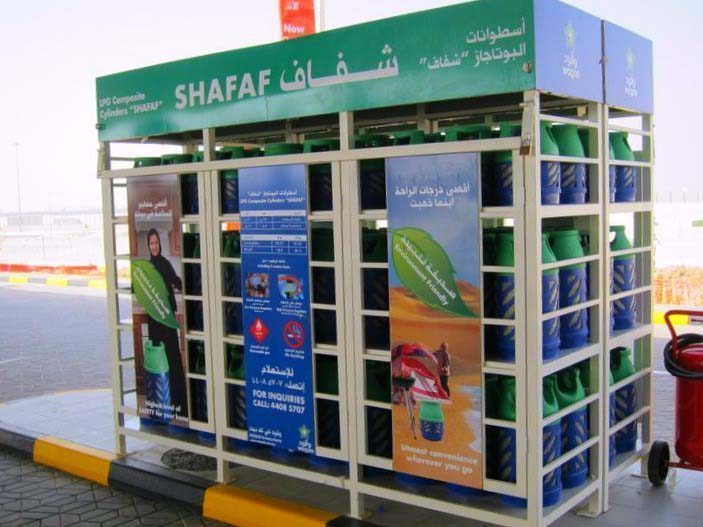
With reporting from Ankita Menon
Updated on March 18 with comment from Woqod
Following a deadly blast at a restaurant in Qatar last month, Woqod gas stations have ceased selling lightweight Shafaf LPG gas cylinders to customers.
Speaking to Doha News, many stations, including those in Dukhan and West Bay, said they were instructed by their head office to stop selling the gas last week.
The news comes three weeks after 11 people were killed and 35 people injured after a gas tank apparently exploded atop a Turkish restaurant near Landmark Mall.
Following the accident, which is still under investigation, several eateries inside petrol stations were instructed to modify their kitchens to operate with electric stoves instead of LPG.
It appears that residents are now being advised to do the same. Speaking to Doha News, Qatar resident Douglas MacDonald said two Woqod petrol stations refused to sell him gas canisters on Friday, citing a new directive from Civil Defense.
“Our stove has one electric burner, but we will have to buy a new stove as one burner is not enough for a family – unless the government changes its mind,” he said.
A Woqod spokesperson told Doha News that they pulled the Shafaf gas cylinders from petrol stations last week following a directive from the Ministry of Interior, due to last month’s gas blast.
Supermarket sales
The ban has caused some residents to express concern about the availability of Shafaf canisters, which are commonly used for cooking and barbecuing. However, supermarkets are still selling the LPG, the Woqod spokesperson said.
According to the company’s website, the cylinders are available in nearly 200 supermarkets around Qatar, and that number is expected to grow. Many of those shops told Doha News today that they still had the canisters in stock, while others said they had ordered them but not received them yet.
Still, the ban on sales at gas stations appears to be causing some disruptions for these shops.
According to the Peninsula, several Doha supermarkets have ceased selling LPG gas canisters after several of them were stolen last week. Many shops store these cylinders outside of their facilities on metal racks, affixed with locks and chains.
The newspaper adds that supermarkets “have stopped selling the cylinders because we have no place to keep them safely.”
Investigation results
Following last month’s accident, Qatar’s Prime Minister promised a thorough and transparent investigation into what happened. Initially, officials speaking at a press conference the day of the blast said that a large, 1,000-liter LPG tank had exploded, injuring and killing people within a 50m radius.
But Woqod, which owns the tanks, later told local newspapers that the tank had not exploded. Speaking to Gulf Times earlier this month, company officials said they had installed more than 2,800 such tanks across Qatar, and have seen no incidents in the past seven years.
LPG has been criticized in the past few weeks for being volatile. It is a mixture of propane and butane that is highly flammable. But the alternative – installing a piped gas distribution network in Qatar – would require a costly and long-running infrastructure overhaul.
In this vein, Gulf Times quotes Woqod chairman Abdullah bin Hamad al-Attiyah as saying:
“People must be educated as to how they should use gas cylinders. At home, I have been using LPG cylinders for the last 40 years…and I never had any issue.”
Shortly after these statements were made, Qatar’s Prosecutor General ordered a media ban on reporting about the investigation into the blast, until after its official findings were submitted to the relevant court.
Nearly three weeks later, no new information about the case has been released.
Have you been affected by the change in sale policy? Thoughts?







